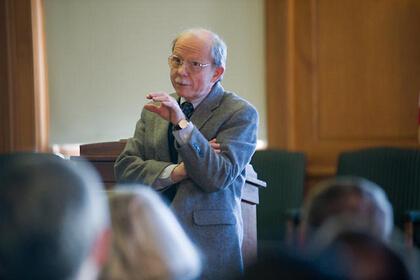The temptation towards wordplay is fierce when writing about Wolfgang Mieder, professor of German and folklore and renowned expert on proverbs -- any subject, any language, any angle, any place in history, from the ancients’ wisdom to snowboarders’ slang. With a wealth of sayings on hard work and social justice alone, deeply held values of Mieder, one might construct an entire narrative out of proverbs. “But!” he would likely warn in professorial cadence, “Moderation in all things!”
For himself Mieder merely chuckles at such advice as he dives into a discussion of his latest work, “Making a Way Out of No Way”: Martin Luther King’s Sermonic Proverbial Rhetoric, the 200th book he’s written or edited. Mieder read some 6,000 pages of King’s published texts, collecting, cataloguing and analyzing, in the process, he says, telling the story of King’s life, a biography in proverbs. His comprehensive index -- more entertaining than the term implies -- is longer than the book’s 16 chapters, containing 1092 proverbs and proverbial phrases, each shown in every context that King used them, sourced and dated.
Here Mieder makes clear that King’s oratory gifts owe much to literature, the Bible and the rhetoric of great human rights leaders who came before him -- Frederick Douglass, Abraham Lincoln, Theodore Parker. With King’s vast intellectual repertoire, coupled with the traditional anaphora or repetition of an African American preacher, “it was almost as if he were bombarding you,” says Mieder, using, he’s calculated, an average of one “wisdom expression” for every 5.5 pages of text.
Among King’s favorite phrases were Carlyle’s “no lie can live forever,” Donne’s “no man is an island entire of itself,” Jefferson’s “all men are created equal,” a quotation that takes on proverbial status through repetition, all employed, as Mieder writes, “as linguistic signs in the service of desegregation, civil rights, and freedom.” From King’s biblical stock, “love your enemies,” and “he who lives by the sword shall perish by it,” in essence define his nonviolent creed, Mieder says.
How to rock the pews
King of course used original language -- Mieder is convinced that King coined “injustice anywhere is a threat to justice everywhere” -- and yet he relied heavily on what Mieder calls “set pieces,” proverb-rich speech that could be easily summoned and powerfully received. If King ever edged toward cliché, overusing expressions at times, Mieder reminds that while he may have noticed, having obsessively combed the entirety of his work at once, King often gave two speeches a day, certainly 300 a year, many of which were spontaneous and generally to a different audience.
In contrast, Barack Obama, whose proverbial rhetoric Mieder wrote about in his 2009 book, Yes We Can, has no such luxury with an ever-present media. Obama, for the most part, makes careful, studied use of proverbs, using three or four in a speech, according to Mieder. His basic intuition aligns with King’s.
“Using a proverbial or metaphorically proverbial element from time to time gives a speech a certain amount of emotion, warmth -- and also lets the audience identify with what you’re saying,” Mieder explains.
Obama freely acknowledges his debt as an orator to Douglass, Lincoln and especially King. Standing on the shoulders of giants, a favorite proverbial metaphor of Mieder’s, whether talking about rhetoricians or his own scholarly heroes.
Civil discourse
Having previously written about the use of proverbs in the speeches not just of Obama but also of those giants Douglass and Lincoln, Making a Way Out of No Way fills in a great 20th century gap. That title, an African American proverb of unknown origin, characterizes for Mieder all that King stood for in his struggle for universal human rights, despite the ubiquity of “I have a dream.”
“You see, ‘I have a dream’ is different,” Mieder says. “’I have a dream’ is just ‘I have an idea, I have a wish.’ ‘Making a way out of no way’ expresses what he did with word and deed.”
Mieder has a soft spot for King, having arrived in America from Germany in 1960 at the age of 16. From his vantage as a teenager in Detroit, living with an ideologically progressive family, the cause of civil rights made its mark.
Talking to Mieder and reading his often moving analysis of King’s use of language it becomes clear that anyone tempted to trivialize proverb study should rethink. While proverbs run the gamut from silly to slurs, they communicate human experience, representing an idea, says Mieder, often as naturally as normal words.
“It behooves us to pay attention to (proverbs) because they are powerful,” Mieder says. “They are not sacrosanct, they are not simplistic. In fact they can be terribly dangerous…sometimes language is tricky. We don’t think enough about language.”
Mieder undoubtedly does think enough about language. With his comprehensive knowledge of proverbs it’s clear that he is linguist, historian, philosopher with a reach into countless other fields of study. He admits he can sit at his desk happily for 15 hours at a stretch.
“Maybe the word 'workaholic' isn’t only negative,” Mieder posits. “I would at least add the adjective a damn happy workaholic.” Almost a proverb, if it could only catch on.
